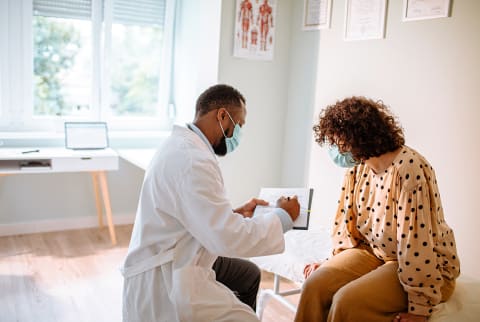Advertisement
4 Expert-Approved Tips To Be More Empowered In Your Health In 2022


In order to make the best health care choices for yourself, it's important to feel empowered in a doctor's office setting. As researcher and medical decision-making expert Talya Miron-Shatz, Ph.D., declares on the mindbodygreen podcast: "You have vital information about your symptoms, about how you feel, about what you've been doing," says Miron-Shatz. "And someone should listen to you.
While feeling empowered in your health sounds wonderful in theory, what does that actually entail? How do you get to a place where you leave the doctor's office feeling confident, safe, and well taken care of? According to Miron-Shatz, these actionable steps are a must:
Find a doctor you trust.
"We have to make sure that we have a [doctor-patient] relationship with someone we trust, who listens to us and who conveys information to us in ways we understand," says Miron-Shatz. "This is crucial. That's the first step." And just like any other relationship in your life, there are some common red flags to watch out for: lack of eye contact, medical gaslighting, and shutting down alternatives are all surefire signs it may be time to break up.
"When you're choosing a doctor, it's important to feel connected to this person—you're going to get better treatment and better health outcomes," Miron-Shatz adds. All that to say: A significant part of health care empowerment is leaving the doctor's office feeling safe and supported.
Ask questions.
Let's be real: Medical jargon can be confusing. "It's a language we don't necessarily speak," Miron-Shatz says. So rather than smiling, nodding, and vowing to Google every single word on your way home, Miron-Shatz offers a simple solution: Just ask for clarification! "It's fine and legitimate to not understand, and it's your job to ask and to inquire," she adds. "Rather than be embarrassed about it and thinking, 'Well, the doctor's going to think I'm stupid,' just ask."
In addition to clarification questions, Miron-Shatz suggests you pose the following when choosing a treatment: What are the risks, what are the benefits, and what are the alternatives? These three questions can help you understand a potential intervention from multiple angles and help you feel more empowered. And if your doctor dismisses these questions? It may be time to reevaluate the relationship.
Write things down.
It's a common scenario, according to Miron-Shatz: You're at the doctor's office, you're asking questions to fully understand all the medical jargon, and you instantly forget all the information as soon as you get home. The solution? Write everything down, even if you swear you'll remember.
Not only can writing things down help you digest the information better—as your thoughts can spiral a mile a minute, whereas the act of pen on paper forces you to stop and reflect—but you'll have some sort of tangible, actionable plan in your grasp. "Write things down, or have your doctor write them down for you," she says. "It can be very simple. It doesn't have to be digital. It doesn't have to be sophisticated, but it's a tool that you need."
Voice your own opinions.
After you have (and understand) all the information, Miron-Shatz urges you to voice your opinions and concerns, if you have any. People often feel uncomfortable to ask their doctor about alternatives in fear of potentially disrespecting their expertise. However, asking about alternative options does not mean that you don't trust your doctor. "It just means you're being educated, informed, and empowered," she says.
She continues: "When someone says something that doesn't resonate with you, are you in a place where you can say, 'You know, Doctor, I hear you, but I'm not sure because it's not taking into account the fact that I also have headaches, or that this happens more on days when I eat corn,' or whatever things might be happening," she adds. "It's legitimate for us to voice our concerns, taking into account the doctor's [time] constraints. We have to be very concise, but we deserve answers."
Plus, says Miron-Shatz, you should be able to have an open conversation with your doctor without feeling judged: Say, if you haven't been following their advice for the last few weeks or if you'd like their thoughts on a new supplement routine you've started. "We need to be able to confide in them," she says.
The takeaway.
By feeling empowered in your health, you can take ownership of your well-being journey, knowing you have a professional who stands confidently by your side. It takes a bit more work and courage to actually implement these habits, but according to Miron-Shatz, you'll feel way more secure in the long run.
